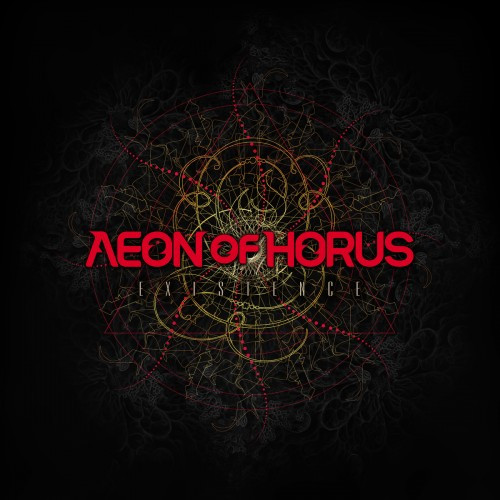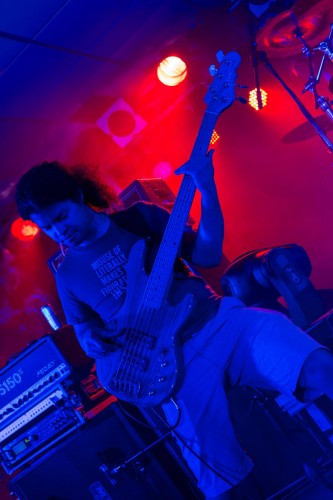(Continuing with our week-long series of daily reviews by DGR, here’s a write-up on the 2014 album by Aeon of Horus.)
On occasion, it seems like we’ll randomly take the site through bursts of music that are coming out of Australia. Australia has a hell of a metal scene and it is one that always seems to have a couple of really good acts just off of the periphery and hidden from view. No idea why, whether it be travel expenses or those huge bodies of water that separate it from the nations where most of the media that cover metal seem to be based. Whatever the reason, we can use the power of the internet for some good, because it really has allowed us to stumble into and search out all sorts of amazing bands.
Aeon Of Horus are a Canberra, Australia-based progressive metal band. I hesitate to call them death metal, because outside of a chosen grunted vocal style the band are much more in favor of using different angular riffs, start-and-stop heavy dynamics, and various ways of interweaving a keyboard into the music.
They’ve received some critical notice before, yet 2014 brings forth only their second new album. They released an EP in 2011, but the gap between full albums is much larger, with a six-year space between the group’s new album Existence and their 2008 release, The Embodiment Of Darkness And Light.
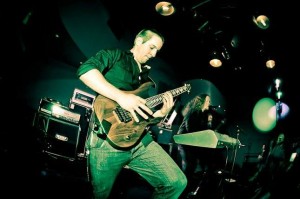 While still heavy on titling their albums with E’s (their EP? Exile), a lot can happy to a band in six years. One can rightly assume that even with only a three-year gap between new music releases, the band have spent much of that time exploring and playing with different musical styles. Existence is the culmination of a lot of that. It is an album full of exploration and different strange guitar performances that keep things very interesting.
While still heavy on titling their albums with E’s (their EP? Exile), a lot can happy to a band in six years. One can rightly assume that even with only a three-year gap between new music releases, the band have spent much of that time exploring and playing with different musical styles. Existence is the culmination of a lot of that. It is an album full of exploration and different strange guitar performances that keep things very interesting.
At first blush, Aeon of Horus might appear to be another technically proficient band led by a keyboardist/vocalist — a combination that we’ve seen before. What the band do within those confines, however, is very different. Their music feels like it was intentionally written to be as complex as they could get it.
They do rely heavily on keyboard ambiance and often cause their songs to have a lurching flow, as they start and stop on a dime. Often, the guitar parts are a couple of really quick strums, then a stop, then another quick railing, so that their music almost sounds like it has been written via typewriter keystrokes. Yet the music remains interesting throughout Existence, because it feels like Aeon Of Horus have worked their damndest to make the “prog” part of their genre descriptor actually mean something.
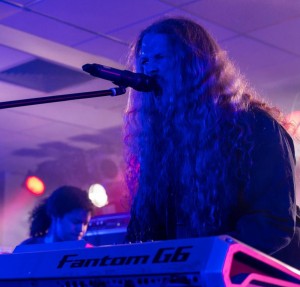 The band do so many different things in the negative space of their songs, in the stopgaps, that each synced-up battering, where every instrument seems to be moving in the exact same motion, feels just as intense. Even lyrically, the songs sound more like they’re being barked than yelled by vocalist Andy Annand, who also plays the keys while hiding behind a mighty mane of hair.
The band do so many different things in the negative space of their songs, in the stopgaps, that each synced-up battering, where every instrument seems to be moving in the exact same motion, feels just as intense. Even lyrically, the songs sound more like they’re being barked than yelled by vocalist Andy Annand, who also plays the keys while hiding behind a mighty mane of hair.
His grunted style could be described as a mid-range and slightly more slurred enunciation style than Omnium Gatherum’s vocalist Jukka Pelkonen and more in line with fellow Australian George Kosmas of Be’lakor . He’s even prone to placing effects upon his own vocals to make himself sound as robotic as possible, which makes some of the songs on Existence feel as if they’re being invaded by a cyborg — that just so happens to scream. He’s the juggler of many different tasks though, often handling the synth playing that is both following the guitars and trying to keep up with a rhythm section that is more concerned with sounding like a C&C machine gone mad than trying to write any sort of hook.
That’s not to say that the band don’t do any sort of catchy on Existence. I know that a higher power would probably drop a boat from the sky into my house if I failed to admit that I wrote about 80% of this review with the lead from the song “Symbiosis” stuck in my head. That guitar part alone has been on an endless loop in my brain. It is part of what possessed me to really delve deeply into Aeon of Horus.
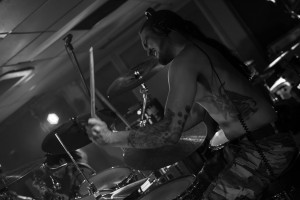 The album doesn’t start that way; instead it introduces Aeon Of Horus as what they mainly are — a super-percussive band with an insanely talented bassist. Recently, a spate of albums have appeared that start with absolutely no buildup whatsoever, and Existence begins the same way, as the band launch the song “Refraction” with the bass guitar popping between so many strings that I imagine Neutrogena probably have their lawyers looking for some way to patent his playing style just to hide it from the public.
The album doesn’t start that way; instead it introduces Aeon Of Horus as what they mainly are — a super-percussive band with an insanely talented bassist. Recently, a spate of albums have appeared that start with absolutely no buildup whatsoever, and Existence begins the same way, as the band launch the song “Refraction” with the bass guitar popping between so many strings that I imagine Neutrogena probably have their lawyers looking for some way to patent his playing style just to hide it from the public.
Drummer Ben Hocking, one of the band’s longtime members, seems to be having a hell of a time behind the kit, filling out so many of the songs. There’s a lot of subtle flourish to his playing that almost gets buried in the huge wall of sound that Aeon of Horus put out. When everyone seems to be competing to be at the top of their game, something is bound to get a little lost, and I think his constant tom fills and cymbal bashing while sailing from one side of the kit to the other tends to lose out a bit to both the bassist and guitarist Peter Meere, who syncs up with the rhythm section of the band quite often — bolstering Aeon Of Horus’ overtly percussive sound.
Existence as a whole, though, pulls off a pretty neat trick by making all its songs feel like an almost hour-long journey. The music is delivered breathlessly, with guitar riffs that seem to jut out like craggy spires over an alien landscape and the only real breathing room consisting of the occasional synth break and pretty piano part. Other than that, listening to Aeon Of Horus is like being sandblasted.
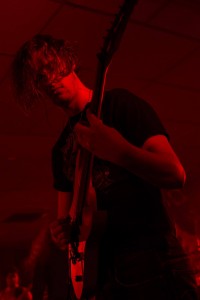 There’s a ton of complexity and hidden depth to the band’s music, and you’re going to know within the first minute of “Refraction” whether or not you can submit yourself to it. That song pretty much spills Existence’s guts on the table, with the balance of the album allowing the band to display them to you in vivid detail — up until the nearly ten-minute epic closer “Resolve”. That song conveniently manages to loop back around into the first song pretty well, which I think is the purpose for having the song fade in like it does.
There’s a ton of complexity and hidden depth to the band’s music, and you’re going to know within the first minute of “Refraction” whether or not you can submit yourself to it. That song pretty much spills Existence’s guts on the table, with the balance of the album allowing the band to display them to you in vivid detail — up until the nearly ten-minute epic closer “Resolve”. That song conveniently manages to loop back around into the first song pretty well, which I think is the purpose for having the song fade in like it does.
The band also clearly have a thing for the one-word song title. Track six is the only that uses two words, and that one only skirts by because it has a “/” right through the center of it.
Aeon Of Horus are a band whose rhythms move in machine-like cycles, and there’s always something intriguing about bands who tend to eschew much of modern song-writing technique to make the music feel like a complex math problem. Existence is a demonstration of that, although it manages to include enough melody to hook you, and call you back again.
Now excuse me, I have a date with another spin of “Symbiosis”. That song is so good.
http://aeonofhorus1.bandcamp.com/album/existence
https://www.facebook.com/Aeonofhorusband

